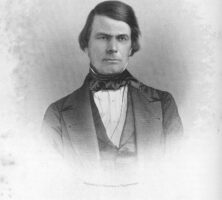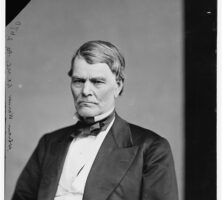Hiram Warner was one of the original members of the Supreme Court of Georgia, eventually becoming that court’s second chief justice. Warner also held office as a circuit court judge, as a representative in the Georgia General Assembly, and as a U.S. congressman.
Born in Williamsburg, Massachusetts, on October 29, 1802, Warner was one of ten children born to Mary Jane Coffin and Obadiah Warner. Warner moved to Georgia in 1822, when he accepted a teaching position at Sparta Academy in Hancock County. He married Sarah Abercrombie Staples of Crawford County, and they had one daughter.
Warner began practicing law in Crawford County after his admission to the bar in 1824 and later served in the state legislature from 1828 to 1831. In 1832 he participated in the Tariff Convention, during which Georgia’s debate over nullification of the 1828 “tariff of abominations” took place. Though the convention passed resolutions strongly denouncing the tariff, which had resulted in a negative impact on the southern economy, the delegates did not go so far as to attempt to nullify the law. While serving in the convention, Warner was elected the first judge of the Coweta Judicial Circuit, a position he held until 1840. In 1840 Warner returned to private law practice, where he remained for the next five years.
The Supreme Court of Georgia was established in 1845 and consisted of three justices. To fill the roles, the legislature elected Joseph Henry Lumpkin, Eugenius Nesbit, and Hiram Warner. Of the three, Warner, the lone Democrat, was also the only justice with prior judicial experience. These justices overcame great odds, solidifying public opinion in favor of the court during a time when its survival was questionable.
Warner resigned from the court in 1853 to run for a seat in the U.S. Congress. He was elected in 1855 and served in the House of Representatives until 1857. Selected in January 1861 as a delegate to the Georgia Secession Convention in Milledgeville, Warner voted against disunion, although he signed the Ordinance of Secession with all the other delegates. During the Civil War (1861-65), Warner was in private law practice.
Upon the death of Lumpkin in 1867, Georgia governor Charles Jones Jenkins appointed Warner as the second chief justice of the supreme court. This chief justiceship lasted only one year, however, due to Georgia’s Reconstruction Constitution of 1868, which gave the governor authority to replace the sitting justices. Republican governor Rufus Bullock added Henry Kent McCay to the court and appointed former governor Joseph E. Brown as chief justice. Warner remained on the court as an associate justice and was again appointed chief justice in 1872.

Courtesy of Library of Congress, Prints and Photographs Division
Warner did not allow the dramatic changes in the aftermath of the Civil War to affect his interpretation of the law. For example, while his new colleagues upheld the popular debt relief legislation of that era, he dissented from their opinions, claiming that the laws were unconstitutional. His legal views, as expressed during his early years as a justice, were almost unchanged when he retired from the court in 1880.
Warner served on the court for a total of thirty-four years and authored almost 2,000 opinions, some of which still influence Georgia law. This pioneer of the Supreme Court of Georgia died in Atlanta on June 30, 1881, at the age of seventy-nine.







